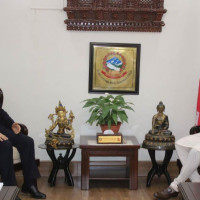- Thursday, 26 February 2026
Communist Parties At A Crossroads
Communism is a stage of society that Marxism defines as the most advanced form of human existence. According to Marxism, humanity will attain this stage of development in the distant future when socialism reaches its advanced stage. At that stage, the class differences of the society will have disappeared, social contradictions solved and the coercive power of the government will have become unnecessary and the state will gradually wither away. Ever since Karl Marx and Frederic Engels propounded this theory of Marxism, its followers have been organising themselves under a party, which was named the communist party by Marx himself, to lead the society to that destination.
The Paris Commune was the first communist state in the history of the communist movement. It was established through a violent insurrection in 1871. It lasted for only 72 days but it carries a great significance as the first experiment on the applicability of Marxist philosophy. Since then, many countries have experienced successful communist revolutions. The most outstanding of them - the October Revolution of 1917, the Chinese Revolution of 1949, the Cuban Revolution of 1955 and the Vietnamese Revolution of 1975- are world-renowned events of the communist revolution. In the early 20th century, the wave of communist revolutions was so widespread that nearly one-third of humanity lived under communism before 1991.
Drastic shift
The rise of communism has, however, undergone a drastic shift since the fall of the Soviet Union and its satellite states of Eastern Europe in the 1990s. Though the communist governments still hold power in some countries of the world, the communist movement as such is said to be on the decline. Over the years, interest in Marxist philosophy has increased as a discipline of learning, but communism is losing its credibility as a better model of statehood.
Questions are often asked why the communists are losing their glamour despite being grounded on one of the most consistent philosophies and the vast support base of working people. Various scholars have studied the communist movement and have found that the cause of its unpopularity lies within its structure rather than the opposition it faces from outside. Czechoslovak dissident Vaclav Havel has said that the communists have lost their glamour because they relied on lies, deception, and ideological rituals. Similarly, Aleksandr Solzhenytsin has blamed its weak moral foundation, atheism and suppressive structure for its failure.
To understand the growing unpopularity of communism, we must go back into the history of its ideological evolution. In the early 20th century, the communist revolution was understood as a part of a global movement. There was an umbrella organization called the Communist International, Comintern in short, to oversee the international communist movement. Gregory Zinoviev, Nikolai Bukharin, and Leon Trotsky were the leaders of the Comintern. They often interfered in the national issues of other communist parties. The Communist Party of China and the Communist Party of India had to openly defy their leadership to preserve their independence.
As a result, Joseph Stalin eventually dissolved it in 1943. An information bureau named Cominform replaced it in 1947 to keep the communist parties of the world within an information network but the Cominform was also dissolved in 1956, leaving the communist parties to operate independently. Karl Marx had envisioned a communist party that would rule on behalf of the people. He described the communist rule as a direct democracy enjoyed by the proletariat. V.I. Lenin further refined the leadership concept, focusing on collective decision, discipline, professionalism and ideological clarity as essential qualities for a communist leadership.
During Joseph Stalin, however, the use of power became more arbitrary, inner contradictions were resolved by suppressing dissidents and the system of collective leadership was completely abandoned. Stalin has fallen from grace but most communist parties appear to be following his rule book even today. They have discarded the principle of collective leadership, concentrated power around a small coterie of trusted followers and have suppressed dissidents. As described by Yugoslav communist scholar Milovan Djilas, the communist party leadership has emerged as a new elite class within the movement and monopolised everything through control in decision-making within party hierarchies.
The experience of the communist movement has provided tools to improve leadership and manage inner contradictions. One of them is 'criticism and self-criticism', which Chinese leader Mao had formulated as the 'magical weapon' to resolve differences. Marxism also instructs its followers to obey the majority decision and avoid a split. But these organisational principles are never honoured. For a communist party, the issue of leadership building and establishing a rule of succession carries paramount importance.
Negative perception
However, the communist parties are not grooming smart and capable future leaders. Instead, they are promoting hero worship and a life tenure system in place, effectively blocking potential future successors from emerging in the party. These deficiencies have been reflected in the negative public perception of these parties, pushing them down to the lowest rung on the popularity ladder.
Even those communist parties that had surprised the world by staging a resurgence against the backlash of the collapse of the Soviet Union now stand at a critical juncture. A massive shift appears to be at work underneath their support base. If these parties do not start consolidating their rank by democratising inner party life, accommodating critical views and facilitating the entry of younger, more capable and competitive leaders at various echelons of party leadership, the brief sunshine of the communist resurgence may soon be over.
(Dr. Bharadwaj is a former ambassador and former chairperson of Gorkhapatra Corporation.)





-square-thumb.jpg)







-original-thumb.jpg)


